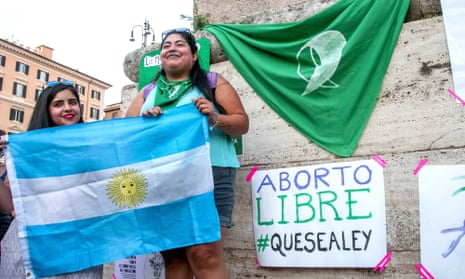The Argentinian senate’s rejection of a bill legalising abortion in the first 14 weeks of pregnancy is a cruel disappointment for millions of its citizens. The legislation had already been passed by the lower house, and Amnesty International said 60% of the public backed it. Feminists blamed pressure from the Catholic church; Pope Francis made clear his opposition to any liberalisation in his homeland or elsewhere.
Some had taken victory in Ireland this May as a harbinger of broader change, though it has yet to have a direct impact in the most obvious place: Northern Ireland, where abortion rights remain tightly restricted and must be reformed. One of the potent arguments which helped to swing the Irish referendum towards resounding support for relaxing its near-total ban was not of morality or ideology, but of fact. Abortion restrictions do not stop abortions: they merely make them harder and very often more dangerous for women. Indeed, one study suggests that abortion rates are slightly higher for countries with restrictive laws.
The main result of Ireland’s law was that more than 150,000 women travelled to have abortions, mostly to England. It denied terminations to only a minority of women, often the most vulnerable – unable to travel due to poverty, a controlling partner or their health. In Argentina’s case, the issue is even starker. Complications related to clandestine abortions are the main cause of death among pregnant women there, according to Human Rights Watch. Amnesty International says that more than 3,000 women have died over the past 25 years in Argentina due to unsafe abortion. Terminations are theoretically legal when the woman’s health is at risk – as well as when her life is in danger, or she has been raped – but often impossible to access.
The global picture is just as alarming. According to the World Health Organization, 25m unsafe abortions are carried out each year. In countries with strict abortion laws, only one in four abortions were safe, compared with almost nine in 10 in countries with more relaxed rules. Worse, there is growing pressure on abortion’s legality or availability in several places. The impact of the religious right in the US is magnified because its effect is exported via the “global gag rule” imposed by Donald Trump, blocking US funds to any group involved in abortion advice and care overseas.
Yet there is room for optimism. Science is not on the side of anti-abortion campaigners. The advent of the abortion pill makes illicit terminations safer and easier to access, though women may face punishment if they need to seek healthcare afterwards. In any case, the overall trend is towards more liberal laws, say campaigners. Last year, Chile approved a bill allowing abortion in some circumstances. Argentinian activists have made it clear they will not give up, taking heart from the public support they attracted and their success in reaching the legislature at all. The battle goes on, there and elsewhere.
